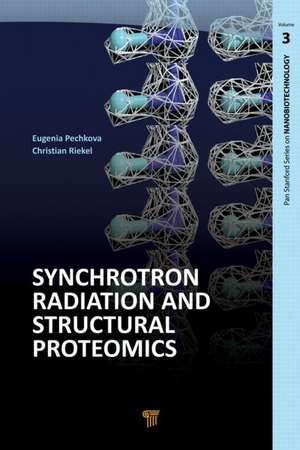Synchrotron Radiation and Structural Proteomics: Jenny Stanford Series on Nanobiotechnology
Editat de Eugenia Pechkova, Christian Riekelen Limba Engleză Hardback – 11 noi 2011
Preț: 729.53 lei
Preț vechi: 881.12 lei
-17% Nou
Puncte Express: 1094
Preț estimativ în valută:
139.64€ • 146.70$ • 117.35£
139.64€ • 146.70$ • 117.35£
Comandă specială
Livrare economică 18 februarie-04 martie
Doresc să fiu notificat când acest titlu va fi disponibil:
Se trimite...
Preluare comenzi: 021 569.72.76
Specificații
ISBN-13: 9789814267380
ISBN-10: 9814267384
Pagini: 300
Ilustrații: 23 b/w images and 115 color images
Dimensiuni: 152 x 229 x 30 mm
Greutate: 0.87 kg
Ediția:1
Editura: Jenny Stanford Publishing
Colecția Jenny Stanford Publishing
Seria Jenny Stanford Series on Nanobiotechnology
ISBN-10: 9814267384
Pagini: 300
Ilustrații: 23 b/w images and 115 color images
Dimensiuni: 152 x 229 x 30 mm
Greutate: 0.87 kg
Ediția:1
Editura: Jenny Stanford Publishing
Colecția Jenny Stanford Publishing
Seria Jenny Stanford Series on Nanobiotechnology
Public țintă
Academic and PostgraduateCuprins
Protein Micro- and Nanocrystallography Using Synchrotron Radiation. Single-Bounce Monocapillary X-Ray Optics: Design and Biological Applications. Thermophilic Enzymes of Potential Industrial Use: Structure and Function. Model Lysozyme Crystal Versus Aggregate, Un Confined Formation as Viewed by Recent Theory Aided by Computer Experiment. Molecular Modeling to Facilitate Protein Crystallization. Structural Analysis of the β-Subunit of the Translation Initiation Factor Aif2 from Different Species: Role of Zn Ions. Towards the Understanding of Molecular Aspects of Helicobacter pylori cag-PAI. Using X-Ray Scattering to Study the Structures of Membrane-Associated Proteins. An Overview of Langmuir Blodgett Protein Crystals via GISAXS, LASER , Raman and AFM. Radiation Damage in Protein Structural Characterization by Synchrotron Radiation: State of the Art and Nanotechnology-Based Perspective. Contactless Sample Manipulation for Synchrotron Radiation Experiments. Gold on Glass—The Annealing Process Investigated with GISAXS and Ellipsometry. Three-Dimensional Visualization of a Human Chromosome Using Coherent X-Ray Diffraction.
Recenzii
"This book provides valuable insight into the growing field of structural proteomics."
—Prof. Gary Stein, University of Massachusetts Medical School, USA
—Prof. Gary Stein, University of Massachusetts Medical School, USA
Notă biografică
Eugenia Pechkova is assistant professor of biochemistry at the medical faculty of University of Genoa, Italy. After acquiring her doctoral degree in chemistry at Moscow State Lomonosov University, Russia, in 1998 and PhD in biophysics at University of Genoa in 2003, she became scientific secretary of Fondazione EL.B.A. (Electronic Biotechnology Advanced) and then scientific director and principal investigator of a big FIRB research grant on organic nanotechnology. Following a postdoctoral position, she has acquired the scientific responsibility of the laboratory of Nanobiocrystallography at the Nanoworld Institute, University of Genoa. In 2007, she worked as a visiting scientist at the European Synchrotron Radiation Facility (ESRF), Grenoble, France, in both the Macromolecular Crystallography group and the Soft Condensed Matter group. She is one of the principal investigators of Radiation Damage BAG. She has authored 36 international scientific publications, two patents, the textbook Proteomics and Nanocrystallography, and chapters to several books. Her main interests are structural proteomics and protein nanocrystallography as well as X-ray radiation damage.
Christian Riekel is member of the Soft Condensed Matter Group at the European Synchrotron Radiation Facility, Grenoble, France. He received his PhD in structural silicate chemistry from the University of Munich in 1973. He has been working as a scientist at the Institut Laue-Langevin in Grenoble, the Max Planck Institute for Solid State Research in Stuttgart, and the Polymer Department of the University of Hamburg, Germany. During his stay in Hamburg, he installed the worldwide first synchrotron SAXS/WAXS beamline for polymer research at HASYLAB/DESY. He moved to Grenoble in 1986 to become part of the ESRF founding team. He was the force behind the construction of the microfocus beamline (ID13). Riekel and his team have developed X-ray micro- and nano-beam techniques for applications ranging from soft matter to biopolymers, including protein crystals. Until 2008, he was head of the ESRF Soft Condensed Matter Group. Riekel has been working on soft matter and biopolymer topics as an emeritus scientist since September 2008. His current principal interests are the development of tools for manipulating small samples in an X-ray beam and the study of the assembly of biopolymers by X-ray scattering techniques.
Christian Riekel is member of the Soft Condensed Matter Group at the European Synchrotron Radiation Facility, Grenoble, France. He received his PhD in structural silicate chemistry from the University of Munich in 1973. He has been working as a scientist at the Institut Laue-Langevin in Grenoble, the Max Planck Institute for Solid State Research in Stuttgart, and the Polymer Department of the University of Hamburg, Germany. During his stay in Hamburg, he installed the worldwide first synchrotron SAXS/WAXS beamline for polymer research at HASYLAB/DESY. He moved to Grenoble in 1986 to become part of the ESRF founding team. He was the force behind the construction of the microfocus beamline (ID13). Riekel and his team have developed X-ray micro- and nano-beam techniques for applications ranging from soft matter to biopolymers, including protein crystals. Until 2008, he was head of the ESRF Soft Condensed Matter Group. Riekel has been working on soft matter and biopolymer topics as an emeritus scientist since September 2008. His current principal interests are the development of tools for manipulating small samples in an X-ray beam and the study of the assembly of biopolymers by X-ray scattering techniques.
Descriere
This book presents an overview of the current state of research in both synchrotron radiation and structural proteomics from different laboratories worldwide. The book presents recent research results in the most advanced methods of synchrotron radiation analysis, protein micro- and nano crystallography, X-ray scattering and X-ray optics, coherent X-Ray diffraction, and laser cutting and contactless sample manipulation are described in details. The book focuses on biological applications and highlights important aspects such as radiation damage and molecular modeling.


